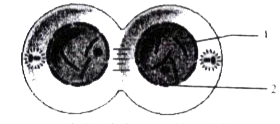When a cell undergoes meiosis, the number of chromosomes in daughter cells will be
Reduced to half
Increased to double
Remains unchanged
Distributes unequally
The correct Answer is:A
Step-by-Step Solution:
1. Understanding Meiosis: Meiosis is a type of cell division that reduces the chromosome number by half. It is crucial for the formation of gametes (sperm and eggs) in sexually reproducing organisms.
2. Phases of Meiosis: Meiosis consists of two main phases: Meiosis I and Meiosis II. The key reduction in chromosome number occurs during Meiosis I.
3. Reductional Division: Meiosis I is often referred to as a reductional division because it reduces the chromosome number from diploid (2n) to haploid (n). This means that the daughter cells will have half the number of chromosomes compared to the parent cell.
4. Homologous Chromosome Segregation: During Meiosis I, specifically in the anaphase stage, homologous chromosomes are segregated into different daughter cells. This segregation is what leads to the halving of the chromosome number.
5. Conclusion: Therefore, when a cell undergoes meiosis, the number of chromosomes in the daughter cells will be reduced to half of that in the parent cell.
Final Answer: The number of chromosomes in daughter cells will be reduced to half.
---
Topper's Solved these Questions
- CELL CYCLE (CELL DIVISION)BOOK - DINESH PUBLICATION ENGLISHCHAPTER - CELL CYCLE (CELL DIVISION)EXERCISE - CHECK YOUR GRASP
18 Videos
- CELL CYCLE (CELL DIVISION)BOOK - DINESH PUBLICATION ENGLISHCHAPTER - CELL CYCLE (CELL DIVISION)EXERCISE - BRAIN TEASERS-III
85 Videos
- CELL CYCLE (CELL DIVISION)BOOK - DINESH PUBLICATION ENGLISHCHAPTER - CELL CYCLE (CELL DIVISION)EXERCISE - BRAIN TEASERS-III
85 Videos
- BIOLOGICAL CLASSIFICATION BOOK - DINESH PUBLICATION ENGLISHCHAPTER - BIOLOGICAL CLASSIFICATION EXERCISE - CYC
13 Videos
- CHEMICAL COORDINATION AND REGULATIONBOOK - DINESH PUBLICATION ENGLISHCHAPTER - CHEMICAL COORDINATION AND REGULATIONEXERCISE - Brain Teasers-V
114 Videos
Similar Questions
Knowledge Check
If an endosperm cell of an angiosperm contains 24 chromosomes, the number of chromosomes in each cell of the root will be
A8B4C16D24
Assertion : Meiosis is also known as reduction division.
Reason : Meiosis reduces the number of chromosomes in daughter cells.
View SolutionStudy the diagram given below which represents a stage during the mitotic cell division and answer the questions that follow:

Which is the cell division that results in half the number of chromosomes in daughter cells?
View SolutionIf the number of bivalents are 8 in metaphase - I, what shall be the number of chromosomes in daughter cells after meiosis -I and meiosis -II respectively:-
View SolutionThe genome of onion has 8 chromosomes (n=8). In a root tip cell undergoing anaphase the number of chromosomes will be
View SolutionIf the cell had 4n number of chromosome at G1, after s phase the number of chromosome in the cell will be :-
View SolutionDuring meiosis, a microspore mother cell has 12 bivalents, the number of chromosomes in its pollen grains will be:
View SolutionWheat root cells have 42 chromosomes. The number of chromosomes in a cell of pollen grain is
View Solution
